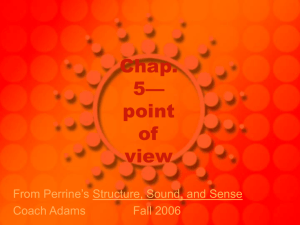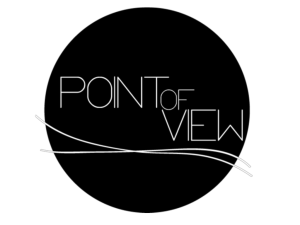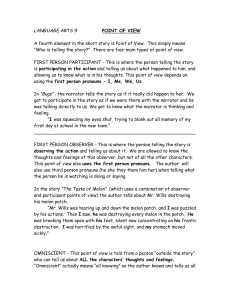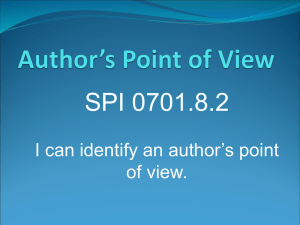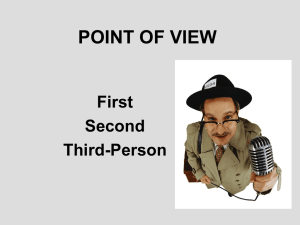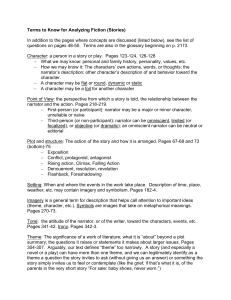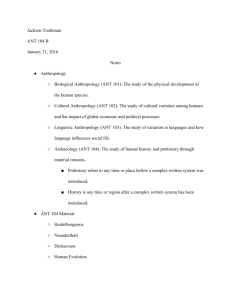Point of View - Mr. Brown's Learning Space
advertisement
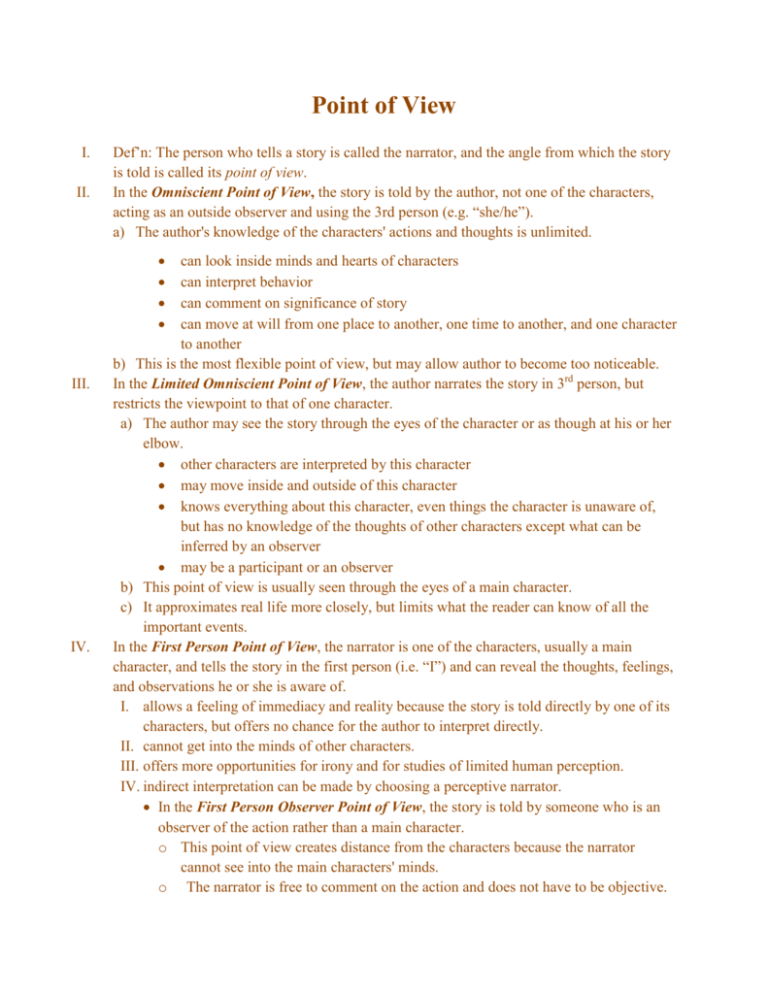
Point of View I. II. Def’n: The person who tells a story is called the narrator, and the angle from which the story is told is called its point of view. In the Omniscient Point of View, the story is told by the author, not one of the characters, acting as an outside observer and using the 3rd person (e.g. “she/he”). a) The author's knowledge of the characters' actions and thoughts is unlimited. III. IV. can look inside minds and hearts of characters can interpret behavior can comment on significance of story can move at will from one place to another, one time to another, and one character to another b) This is the most flexible point of view, but may allow author to become too noticeable. In the Limited Omniscient Point of View, the author narrates the story in 3rd person, but restricts the viewpoint to that of one character. a) The author may see the story through the eyes of the character or as though at his or her elbow. other characters are interpreted by this character may move inside and outside of this character knows everything about this character, even things the character is unaware of, but has no knowledge of the thoughts of other characters except what can be inferred by an observer may be a participant or an observer b) This point of view is usually seen through the eyes of a main character. c) It approximates real life more closely, but limits what the reader can know of all the important events. In the First Person Point of View, the narrator is one of the characters, usually a main character, and tells the story in the first person (i.e. “I”) and can reveal the thoughts, feelings, and observations he or she is aware of. I. allows a feeling of immediacy and reality because the story is told directly by one of its characters, but offers no chance for the author to interpret directly. II. cannot get into the minds of other characters. III. offers more opportunities for irony and for studies of limited human perception. IV. indirect interpretation can be made by choosing a perceptive narrator. In the First Person Observer Point of View, the story is told by someone who is an observer of the action rather than a main character. o This point of view creates distance from the characters because the narrator cannot see into the main characters' minds. o The narrator is free to comment on the action and does not have to be objective. V. In the Objective Point of View, the author refuses to enter the minds of any of the characters and so becomes a kind of roving sound camera. a) The camera goes anywhere, but can only record not comment, interpret, or enter a character's mind. a. the reader is a spectator and must infer feelings & thoughts from what the characters say and do, how they look, and what other characters say about them. b) The objective point of view is sometimes called the Dramatic Point of View because the characters are seen as they would appear in a play. c) The purest form is dialogue. d) It has the most speed and action of all the points of view. b. relies on external action and dialogue Singular / Plural Singular / Plural Singular / Plural Singular / Plural Personal Pronouns Subject Object Possessive Pronominal 1st person I / we me / us my / our mine / ours 2nd person you / you you / you your / your yours / yours 3rd person she / he / it / they her / him / it / them her / his / its / their hers / his / its / theirs Questions about point of view I. Point of view is important for two main reasons: a) A particular point of view can emphasize one character's perception of things. It can also influence our perception of things. The omniscient narrator can tell what a character thinks, but the limited omniscient and first-person points of view make the reader experience what the character thinks. b) Point of view is important when the narrator's trustworthiness is suspect. Who tells the story? Can the narrator be trusted to tell the truth about the events, characters, and the setting of the story? Omniscient narrator can almost always be trusted, but limited omniscient and first-person narrator can be suspect. Do circumstances such as their age, education, social status, prejudices, or emotional states affect their perspectives? Is the author's view different from the narrator's? Omniscient Weary in every limb, the ant tugged over the snow a piece of corn he had stored up last summer. It would taste might good at dinner tonight. A grasshopper, cold and hungry, looked on. Finally, he could bear it no longer. “Please, friend ant, may I have a bite of corn?” “What were you doing all last summer?” asked the ant. He looked the grasshopper up and down. He knew its kind. “I sang from dawn till dark,” replied the grasshopper, happily unaware of what was coming next. “Well, said the ant, hardly bothering to conceal his contempt, “since you sang all summer, you can dance all winter.” Limited Omniscient Weary in every limb, the ant tugged over the snow a piece of corn he had stored up last summer. It would taste mighty good at dinner tonight. It was then that he noticed the grasshopper, looking cold and pinched. “Please, friend ant, may I have a bite of your corn?” asked the grasshopper. He looked the grasshopper up and down. “What were you doing all last summer?” he asked. He knew its kind. “I sang from dawn till dark,” replied the grasshopper. “Well,” said the ant, hardly bothering to conceal his contempt, “since you sang all summer, you can dance all winter.” First Person HE WHO IDLES WHEN HE’S YOUNG WILL HAVE NOTHING WHEN HE’S OLD. Cold and hungry, I watched the ant tugging over the snow a piece of corn he had stored up last summer. My feelers twitched, and I was conscious of a tic in my left hind leg. Finally, I could bear it no longer. “Please, friend ant,” I asked, “may I have a bite of your corn?” He looked me up and down. “What were you doing all last summer?” he asked, rather too smugly it seemed to me. “I sang from dawn to dark,” I said innocently, remembering the happy times. “Well,” he said with a priggish sneer, “since you sang all summer, you can dance all winter.” Objective The ant tugged over the snow a piece of corn he had stored up last summer, perspiring in spite of the cold. A grasshopper, its feelers twitching and with a tic in its left hind leg, looked on for some time. Finally, he asked, “Please, friend ant, may I have a bite of your corn?” The ant looked the grasshopper up and down. “What were you doing all last summer?” he snapped. “I sang from dawn to dark,” replied the grasshopper, not changing his tone. “Well,” said the ant, and a faint smile crept into his face, “since you sang all summer, you can dance all winter.” from Perrine's Story and Structure by Thomas R. Arp and Greg Johnson
